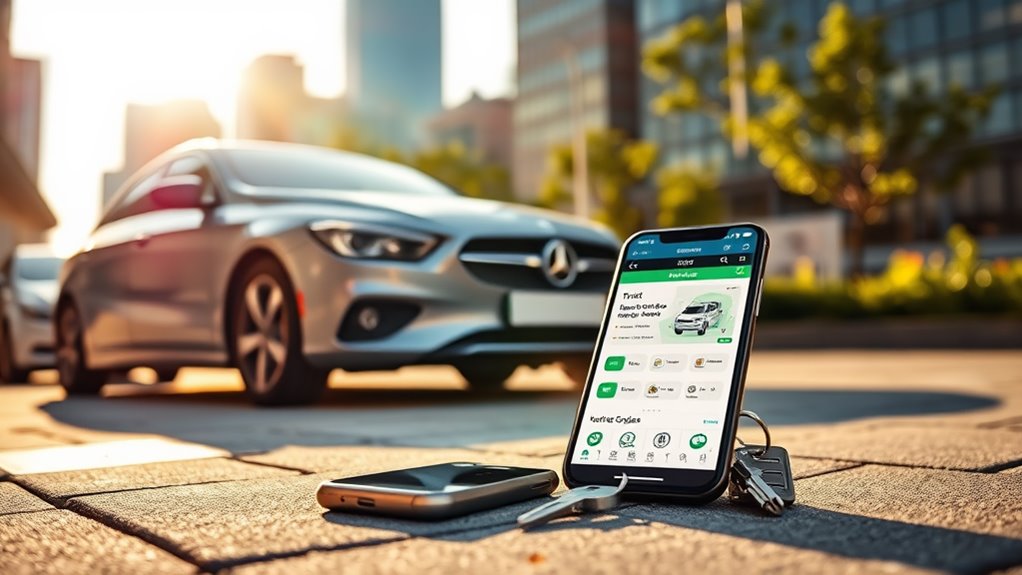Did you know that nearly 40% of car owners are open to sharing their vehicles through peer-to-peer platforms? As this trend grows, understanding insurance becomes essential for both owners and renters. Many personal auto policies don't cover rentals via these services, potentially leaving you exposed. By exploring the nuances of coverage options and state regulations, you can better protect yourself and your assets in this evolving landscape.
As peer-to-peer car sharing continues to gain popularity, understanding the insurance landscape becomes vital for both vehicle owners and renters. This arrangement, where individuals rent out their personal vehicles through platforms like Turo, Getaround, and JustShareIt, presents unique insurance considerations that you need to be aware of.
While these services offer convenience and flexibility, they also come with specific risks and coverage options that differ markedly from traditional rental models. When you consider renting out your vehicle, it's important to know that personal auto policies typically won't cover vehicles rented through peer-to-peer services. This gap means you must rely on the coverage provided by the platform you choose.
Peer-to-peer car sharing offers flexibility but requires understanding the unique insurance risks not covered by personal auto policies.
Turo stands out by offering up to $1 million in liability coverage and physical damage coverage equal to the vehicle's actual cash value. Similarly, Getaround and JustShareIt also provide $1 million in liability coverage, with varying limits on physical damage coverage. These offerings can give you peace of mind, but you must also confirm that your vehicle meets the eligibility criteria, such as being in good condition and having current insurance. Additionally, many platforms require that vehicles used for sharing comply with state insurance laws, which can vary significantly across different regions.
The insurance landscape for peer-to-peer car sharing isn't uniform across all states. Some states require car-sharing platforms to provide a group insurance policy, while others leave vehicle owners to navigate the complexities on their own. If you're considering entering this market, familiarize yourself with local regulations and verify compliance. Understanding these legal frameworks can save you from potential liabilities and unforeseen expenses.
One of the challenges insurers face in this space is the varied nature of drivers and the associated risk factors. The peer-to-peer model inherently involves unfamiliar drivers, which increases the likelihood of accidents and claims. As a result, having a clear determination of liability is vital, especially in multi-party scenarios where multiple individuals are involved. Furthermore, many personal auto insurers often refuse coverage for vehicles used for commercial purposes, underscoring the importance of understanding your insurance options.
Besides liability coverage, some platforms offer additional benefits, like loss of rental income for premium members, which can further enhance your protection as a vehicle owner. When you rent a vehicle, be aware of the potential for excess wear and tear, which some platforms do cover. However, higher deductible amounts can also pose a considerable financial burden in case of accidents or damages.
You should weigh these factors against the costs and benefits of using peer-to-peer car sharing services. As the market evolves, insurers are tasked with innovating strategies tailored to the unique risks of peer-to-peer car sharing. This may include leveraging technology to track vehicle usage and manage risks effectively.
For both vehicle owners and renters, staying informed about insurance options and regulatory requirements will help you navigate this growing landscape safely and responsibly. By understanding your coverage needs and the nuances of peer-to-peer car sharing insurance, you can make better decisions that protect both your vehicle and your financial interests.
Conclusion
In the end, maneuvering insurance for peer-to-peer car sharing might feel like a tricky game of chess. You think you've got it all figured out, but one unexpected move can leave you vulnerable. While platforms promise coverage, your personal policy might just laugh in your face. So, whether you're renting out your car or borrowing someone else's, stay informed and prepared. After all, in the world of car sharing, it's not just the wheels that need protection—it's your peace of mind.

